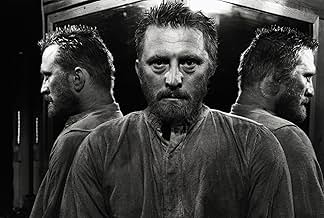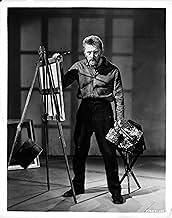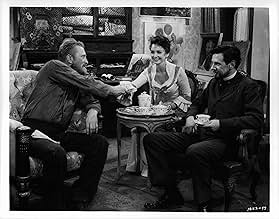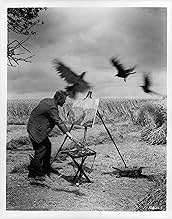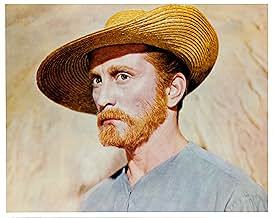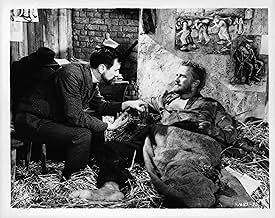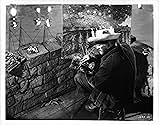VALUTAZIONE IMDb
7,3/10
12.919
LA TUA VALUTAZIONE
La vita straordinaria di un artista brillante ma tormentato: Vincent van Gogh.La vita straordinaria di un artista brillante ma tormentato: Vincent van Gogh.La vita straordinaria di un artista brillante ma tormentato: Vincent van Gogh.
- Regia
- Sceneggiatura
- Star
- Vincitore di 1 Oscar
- 4 vittorie e 6 candidature totali
Recensioni in evidenza
This awesome and vivid picture concerns life of brilliant but tortured artist Vincent van Gogh . He was a Post-Impressionist painter of Dutch origin whose work—notable for its rough beauty , emotional honesty, and bold color—had a far-reaching influence on 20th-century art. The picture has an opening credits prologue: Without museums help and that of private collectors the world over, this motion picture about a great painter could not have been made . Van Gogh life is a disaster , he fails at being a preacher to coal miners , he fails in his relationships with parents (Henry Daniell as Theodorus Van Gogh and wife Madge Kennedy) and women (Pamela Brown) . At the same time the movie deals with other Impressionist painters who appear across footage such as Gauguin (Anthony Quinn won well-deserved Academy Award as painter/friend) , Camille Pissarro (David Leonard) , George Seurat , Millet , Henri de Toulouse-Lautrec ; furthermore, his relationships to known characters such as his brother Theo Van Gogh (James Donald) and Dr. Gachet (Everett Sloane). After years of painful anxiety and frequent bouts of mental illness he commits himself suicide .
Magnificent rendition of Irving Stone's biography of known painter , being finely portrayed , especially his anguishes , unrewarding friendships , poorness , pains and many other things . This splendid film packs emotion , top-drawer interpretation , adequate production design , enjoyable soundtrack and exquisite color in CinemaScope . Interesting and thought-provoking screenplay by Norman Corwin . Terrific acting by the great Kirk Douglas who even had his hair cut specially in the style of the artist and had it dyed to a similar reddish tint . Over-the-top performance by Anthony Quinn as Gauguin but he does not get along with Van Gogh , his playing actually lasts 22 minutes and 40 seconds , he won his Best Supporting Actor Oscar . Evocative as well as sensitive musical score by classical composer Miklos Rozsa . Rousing and glittering cinematography by Russell Harlan and Freddie Young . The color process used for the film -Ansco color, but labeled in the credits as Metrocolor- is supposedly unsuitable for long term color preservation . As a result, many prints have lost the extraordinary brightness of the movie's images . Being shot on location , as many of the locations used for filming were the actual locations Vincent van Gogh visited in his life ; parts of the film were shot in Auvers-sur-Oise, where Vincent van Gogh lived and died . This motion picture perfectly produced by actor/producer John Houseman was stunningly directed by Vincente Minnelli who even had a portion of a field spray-painted yellow to closer resemble Vincent van Gogh's painting.
The flick is well based on actual events , these are the followings : Van Gogh spent his early adulthood working for a firm of art dealers, traveling between The Hague, London, and Paris, after which he taught for a time in England at Isleworth and Ramsgate. One of his early aspirations was to become a pastor, and from 1879 he worked as a missionary in a mining region in Belgium, where he began to sketch people from the local community. In 1885, he painted his first major work, entitled The Potato Eaters. His palette at the time consisted mainly of somber earth tones and showed no sign of the vivid coloration that distinguished his later work. In March 1886, he moved to Paris and discovered the French Impressionists. Later, he moved to the south of France and was influenced by the strong sunlight he found there. His work grew brighter in color, and he developed the unique and highly recognizable style that became fully realized during his stay in Arles in 1888. The extent to which his mental health affected his painting has been a subject of speculation since his death. Despite a widespread tendency to romanticize his ill health, modern critics see an artist deeply frustrated by the inactivity and incoherence brought about by his bouts of illness. Van Gogh's late works show an artist at the height of his ability, completely in control and "longing for concision and grace". He died aged 37 from a gunshot wound, generally accepted to be self-inflicted although no gun was ever found .
Magnificent rendition of Irving Stone's biography of known painter , being finely portrayed , especially his anguishes , unrewarding friendships , poorness , pains and many other things . This splendid film packs emotion , top-drawer interpretation , adequate production design , enjoyable soundtrack and exquisite color in CinemaScope . Interesting and thought-provoking screenplay by Norman Corwin . Terrific acting by the great Kirk Douglas who even had his hair cut specially in the style of the artist and had it dyed to a similar reddish tint . Over-the-top performance by Anthony Quinn as Gauguin but he does not get along with Van Gogh , his playing actually lasts 22 minutes and 40 seconds , he won his Best Supporting Actor Oscar . Evocative as well as sensitive musical score by classical composer Miklos Rozsa . Rousing and glittering cinematography by Russell Harlan and Freddie Young . The color process used for the film -Ansco color, but labeled in the credits as Metrocolor- is supposedly unsuitable for long term color preservation . As a result, many prints have lost the extraordinary brightness of the movie's images . Being shot on location , as many of the locations used for filming were the actual locations Vincent van Gogh visited in his life ; parts of the film were shot in Auvers-sur-Oise, where Vincent van Gogh lived and died . This motion picture perfectly produced by actor/producer John Houseman was stunningly directed by Vincente Minnelli who even had a portion of a field spray-painted yellow to closer resemble Vincent van Gogh's painting.
The flick is well based on actual events , these are the followings : Van Gogh spent his early adulthood working for a firm of art dealers, traveling between The Hague, London, and Paris, after which he taught for a time in England at Isleworth and Ramsgate. One of his early aspirations was to become a pastor, and from 1879 he worked as a missionary in a mining region in Belgium, where he began to sketch people from the local community. In 1885, he painted his first major work, entitled The Potato Eaters. His palette at the time consisted mainly of somber earth tones and showed no sign of the vivid coloration that distinguished his later work. In March 1886, he moved to Paris and discovered the French Impressionists. Later, he moved to the south of France and was influenced by the strong sunlight he found there. His work grew brighter in color, and he developed the unique and highly recognizable style that became fully realized during his stay in Arles in 1888. The extent to which his mental health affected his painting has been a subject of speculation since his death. Despite a widespread tendency to romanticize his ill health, modern critics see an artist deeply frustrated by the inactivity and incoherence brought about by his bouts of illness. Van Gogh's late works show an artist at the height of his ability, completely in control and "longing for concision and grace". He died aged 37 from a gunshot wound, generally accepted to be self-inflicted although no gun was ever found .
Not only does KIRK DOUGLAS bear a remarkable resemblance to the real Vincent Van Gogh, but he gives a deeply felt, bigger than life performance in the role of a lifetime, fully deserving his Academy Award nomination.
The letterbox version on TCM doesn't do justice to the film's brilliant color photography, deliberately muted for the early coal mining scenes but crisp and clear when it comes to Van Gogh's now famous paintings. I haven't seen the DVD version, but I hope it's considerably better than the print showing on cable.
At any rate, it's tremendously well done--the entire look of the production creating the sense of time and authentic atmosphere and actually filmed on the actual location sites with an impressive cast of villagers and supporting actors. PAMELA BROWN, NIALL MacGINNIS (as The Postman), and most of all, JAMES DONALD as brother Theo, who nurtures his brother and supports him financially but is unable to sell any of his paintings--except one.
It's a fine recreation of the Irving Stone novel and Douglas immerses himself in the character of Van Gogh, much the way ANTHONY QUINN does as Gauguin. Quinn's stormy, tempestuous relationship with Douglas provides some electric moments of conflict.
The score by Miklos Rozsa accents the drama at every turn, slashing at the drama the way Van Gogh slashed at his canvas with thick brush strokes. It's starkly dramatic without ever being overbearing.
Vincent Minnelli's direction is above reproach. A finer tribute to the tormented artist could not be imagined with so many of his canvases shown on screen in impressive close-ups.
The letterbox version on TCM doesn't do justice to the film's brilliant color photography, deliberately muted for the early coal mining scenes but crisp and clear when it comes to Van Gogh's now famous paintings. I haven't seen the DVD version, but I hope it's considerably better than the print showing on cable.
At any rate, it's tremendously well done--the entire look of the production creating the sense of time and authentic atmosphere and actually filmed on the actual location sites with an impressive cast of villagers and supporting actors. PAMELA BROWN, NIALL MacGINNIS (as The Postman), and most of all, JAMES DONALD as brother Theo, who nurtures his brother and supports him financially but is unable to sell any of his paintings--except one.
It's a fine recreation of the Irving Stone novel and Douglas immerses himself in the character of Van Gogh, much the way ANTHONY QUINN does as Gauguin. Quinn's stormy, tempestuous relationship with Douglas provides some electric moments of conflict.
The score by Miklos Rozsa accents the drama at every turn, slashing at the drama the way Van Gogh slashed at his canvas with thick brush strokes. It's starkly dramatic without ever being overbearing.
Vincent Minnelli's direction is above reproach. A finer tribute to the tormented artist could not be imagined with so many of his canvases shown on screen in impressive close-ups.
This is one of my favorite films. It deeply touched me. It's in my top 20 for sure. Maybe top 10. The acting, directing, and production are all about as good as it gets. It's a shame Kirk Douglas didn't win the best actor Oscar. I think it's his finest performance. I can't think of a single bad thing to say about this great movie. It's a vivid (and accurate) tribute to the immortal Vincent.
Although I started my academic career as an art major, my interest was always in making art of my own rather than studying the works of the past masters. As a result, I wouldn't know a Manet from a Monet, but one painter whose work I can always identify is Vincent Van Gogh, perhaps the most famous example of the "tortured artist" who sought solace from the pain of life through his work. Like so many artists from different mediums, Van Gogh's life, especially the dramatic episode in which he sliced off his ear in an epileptic fit, is more famous than his work, a situation heightened, no doubt, by Don Mclean's melancholy ballad "Vincent," an improbable chart topper in 1972. Prior to being honored by the composer of "American Pie," Van Gogh's biggest brush with popular success came with Vincent Minnelli's film of Irving Stone's best-seller, an often melodramatic but still effective dramatization of the artist's troubled life. Kirk Douglas' intense portrayal of the impoverished and often fanatical Dutchman is helped immeasurably by his physical resemblance to his subject. Bearded, and with his blonde hair dyed red, Douglas could easily be mistaken for the man whose self-portraits hang on the wall of the modest bedroom where much of the film takes place. Occasionally, Douglas' clenched teeth and fist approach to drama comes through to reveal the actor behind the makeup, but his Oscar nominated performance seldom falls victim to the actor's "star" persona. Even Anthony Quinn, an actor who has given the same performance in dozens of movies, is good, but his brief turn as Paul Gaughan is hardly distinguished enough to merit the Oscar for best supporting actor. The rest of the cast is beautifully assembled with James Donald properly sympathetic as Vincent's patient, supportive brother, Theo, and no way can I complain about any film that finds room for the splendid presence of Henry Daniell, seen here as the patriarch of the Van Gogh family. The paintings, a wild riot of colorful intensity, are seen throughout (courtesy of numerous private collectors and public museums, including my hometown's Cleveland Museum of Art), and without them, "Lust for Life" would have a lot less luster.
I've seen this movie several times now, and every time with enjoyment and great appreciation.
The acting by Douglas and Quinn is truly first rate. It's a shame Douglas didn't get the best actor Oscar for which he was so deservedly nominated, but competition that year in that category was fierce. He truly makes you feel van Gogh's frightened agony, both at not being able to achieve what he wanted in his art and his fear of approaching insanity. (It ran in van Gogh's family; he knew what was coming.)
But I also enjoy the great efforts made to reproduce the scenes van Gogh painted, whether in Holland, Arles, or outside Paris. That couldn't have been easy, but if you know van Gogh's work, it really adds to the effect the movie makes.
There are times when the characters speak like an art history textbook - though those painters did love to discuss their theories on art, as you see in their letters.
Still, I consider this to be one fine movie. Whether it gives an accurate depiction of van Gogh or Gauguin is beside the point. It's based on a novel by Irving Stone, who didn't hesitate to change facts to make for a book that would sell; it's not a BBC documentary, and shouldn't be judged as such. It does a great job of showing us the torments of a great painter, and gives us some idea of what van Gogh was up to. That's more than enough for me.
The acting by Douglas and Quinn is truly first rate. It's a shame Douglas didn't get the best actor Oscar for which he was so deservedly nominated, but competition that year in that category was fierce. He truly makes you feel van Gogh's frightened agony, both at not being able to achieve what he wanted in his art and his fear of approaching insanity. (It ran in van Gogh's family; he knew what was coming.)
But I also enjoy the great efforts made to reproduce the scenes van Gogh painted, whether in Holland, Arles, or outside Paris. That couldn't have been easy, but if you know van Gogh's work, it really adds to the effect the movie makes.
There are times when the characters speak like an art history textbook - though those painters did love to discuss their theories on art, as you see in their letters.
Still, I consider this to be one fine movie. Whether it gives an accurate depiction of van Gogh or Gauguin is beside the point. It's based on a novel by Irving Stone, who didn't hesitate to change facts to make for a book that would sell; it's not a BBC documentary, and shouldn't be judged as such. It does a great job of showing us the torments of a great painter, and gives us some idea of what van Gogh was up to. That's more than enough for me.
Lo sapevi?
- QuizMany of the locations used for filming were the actual locations Vincent van Gogh visited in his life.
- BlooperAt Arles, when Paul Gauguin is explaining his philosophy, Vincent mistakes him for Theo saying "but Theo, err Paul..." However, this is in the script. The whole point of the line is that Van Gogh views his conversation with Gauguin as nothing more than an extension of talks he's had with Theo since childhood.
- Citazioni
Paul Gauguin: I'm talking about women, man. Women. I like 'em fat and vicious and not too smart. Nothing spiritual either. To have to say 'I love you' would break my teeth. I don't want to be loved.
Vincent Van Gogh: You really mean that, Paul.
- ConnessioniFeatured in Van Gogh: buio nella luce (1956)
- Colonne sonoreLa Marseillaise
(1792) (uncredited)
Written by Claude Joseph Rouget de Lisle
Played by a band in France, near the end
I più visti
Accedi per valutare e creare un elenco di titoli salvati per ottenere consigli personalizzati
Dettagli
Botteghino
- Budget
- 3.227.000 USD (previsto)
- Tempo di esecuzione
- 2h 2min(122 min)
- Proporzioni
- 2.55 : 1
Contribuisci a questa pagina
Suggerisci una modifica o aggiungi i contenuti mancanti

![Guarda Trailer [OV]](https://m.media-amazon.com/images/M/MV5BNjMwYjdhMDItMDA1NC00YjJlLWFhZjctYWY5YjBlNDdiODFiXkEyXkFqcGdeQXRyYW5zY29kZS13b3JrZmxvdw@@._V1_QL75_UX500_CR0)
